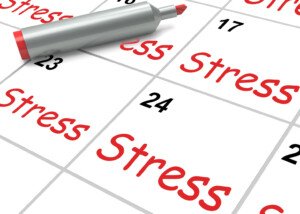
You can help prevent heart disease with a potent form of exercise called “hormonal.”
This kind of exercise unleashes hormones that nullify stress hormones that are activated when your body goes into a “fight or flee” mode.
Modern People Don’t Fight; They Sit & Seethe
Mental stress is damaging to the heart in our modern times, because today’s stress is not met with a “fight or flight” response.
Intense physical exercise counteracts the damaging effects of stress hormones and helps prevent heart disease.
- An example of fight-or-flight exercise is a set of heavy leg presses to complete fatigue, quickly followed by as many squat jumps as you can.
- Another example is sprinting as fast as you can on a treadmill for 30 seconds (NO holding on), then immediately knocking off pushups to muscle failure.
- Any big compound strength training exercise that leaves you heavily panting at the end — like deadlifts.

Freepik.com
Model Our Ancient Ancestors
Primitive man, when fighting or fleeing from danger, didn’t have the luxury of convenient rests. He had to keep pushing in the name of survival.
Modern man must exercise this same way, to defeat stress hormones that cause heart disease. This is why rest periods between intense exercises should not be too long.
“Triggered by fear, stress activates the fight-or-flight response and releases stress hormones that can potentially damage cardiac tissue,” says John M. Kennedy, MD, in his book, The 15 Minute Heart Cure: The Natural Way to Release Stress And Heal Your Heart In Just Minutes A Day.
He is medical director of preventative cardiology and wellness at Marina del Rey Hospital.
The fear that Dr. Kennedy references can be the fear that a hunter-gatherer person experiences upon being faced with a wild boar 50,000 years ago, or the fear of what your boss at work wants to see you about at the end of the day.

Freepik.com, katemangostar
The human body does not distinguish between these different sources of fear.
The stress response is the same for both kinds of fear: Fear “activates the amygdala, the emotional center of the brain,” says Dr. Kennedy in his book.
This primitive part of the brain stimulates the memory part, called the hippocampus.
Next in the chain of events is the release of stress hormones to prepare the body for fighting — or fleeing — from the perceived threat. Among the responses is a racing heart to supply more oxygen to working muscles.
Dr. Kennedy explains in the book, “This same pattern and cascade of events occurs for less stressful events than meeting a bear, such as being late for work, financial pressures, or having a marital spat.”
The stress hormones in ancient man didn’t have much time to run amok in his body and cultivate heart disease because he either fought the danger or ran from it; either choice required intense physical exertion.
Modern Man Can’t Always Sprint Away from Stress
If you fight your boss at work, you’ll get fired and arrested for assault. If you run from him, you’ll get “written up.”
Other stressful scenarios have you trapped — inside your car during a traffic jam, making you late for an important appointment.
Since you’re not able to fight or run, the stress hormones remain circulating in high amounts, wreaking havoc throughout your body and accelerating heart disease.
Since you can’t pick up your boss and body-slam him at the onset of stress, then the next best thing is to hit the gym right after work.
- After your chin-ups, do fast stepping up and down on a stool while holding 10-20 pound dumbbells.
- After the renegade rows (combination of pushup and dumbbell row), do 30 seconds of jumping alternating lunges.

High intensity interval training is another way to sabotage the damaging effects that stress hormones have on the heart.
- Sprint as fast as you can down your street.
- Walk back to the starting point, and sprint again.
- Walk back.
- Do eight sprints total. You’ll feel as though you just fought off a bear or ran from one that was chasing you through the woods.
Short bouts of very intense exercise increase production of muscle-building and fat-burning hormones.

These hormones take out the stress hormones. Exercise that can be sustained for lengthy periods, such as a duration-based jog, does not produce these stress-fighting hormones.
Stress Promotes Heart Disease
Stress really does kill, and really does encourage heart disease. Modern-day living is crammed with stress, and traps you in your workplace cubicle, workplace meeting, dentist’s office, dinner table with tempers flaring, going through the month’s bills, etc.
Chronically elevated levels of stress hormones will ravage the body and disease the heart over time.
So go to the gym; the gym is your jungle to slay beasts or flee from them, to maintain good heart health.
Exercise like a warrior to avoid the detrimental effects of the body’s fight or flight response.
 Double board certified in cardiovascular disease and also internal medicine, Dr. Kennedy’s special interest is stress and how it adversely affects a person’s delicate cardiovascular system.
Double board certified in cardiovascular disease and also internal medicine, Dr. Kennedy’s special interest is stress and how it adversely affects a person’s delicate cardiovascular system.
 Lorra Garrick has been covering medical, fitness and cybersecurity topics for many years, having written thousands of articles for print magazines and websites, including as a ghostwriter. She’s also a former ACE-certified personal trainer.
Lorra Garrick has been covering medical, fitness and cybersecurity topics for many years, having written thousands of articles for print magazines and websites, including as a ghostwriter. She’s also a former ACE-certified personal trainer.
.


























